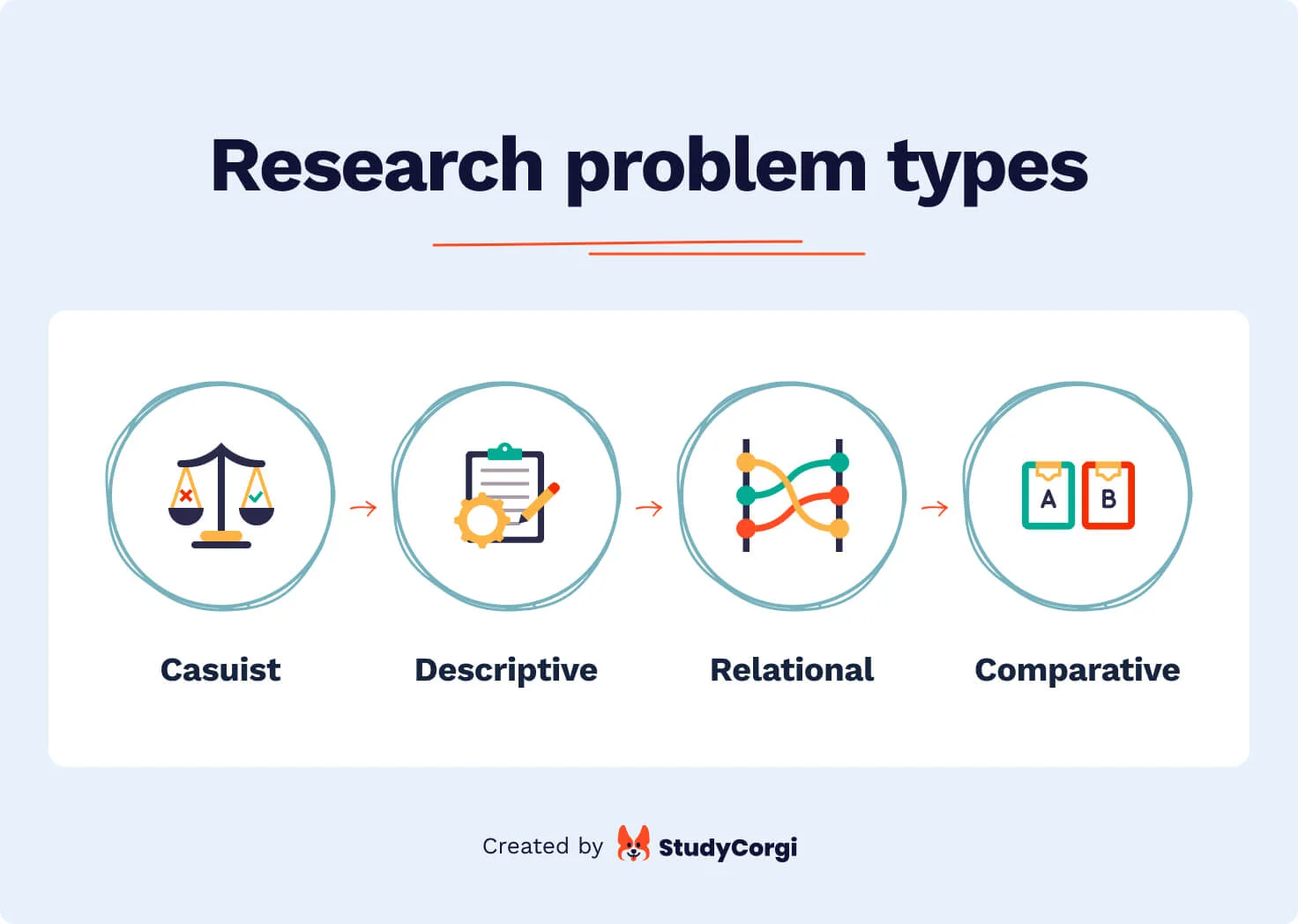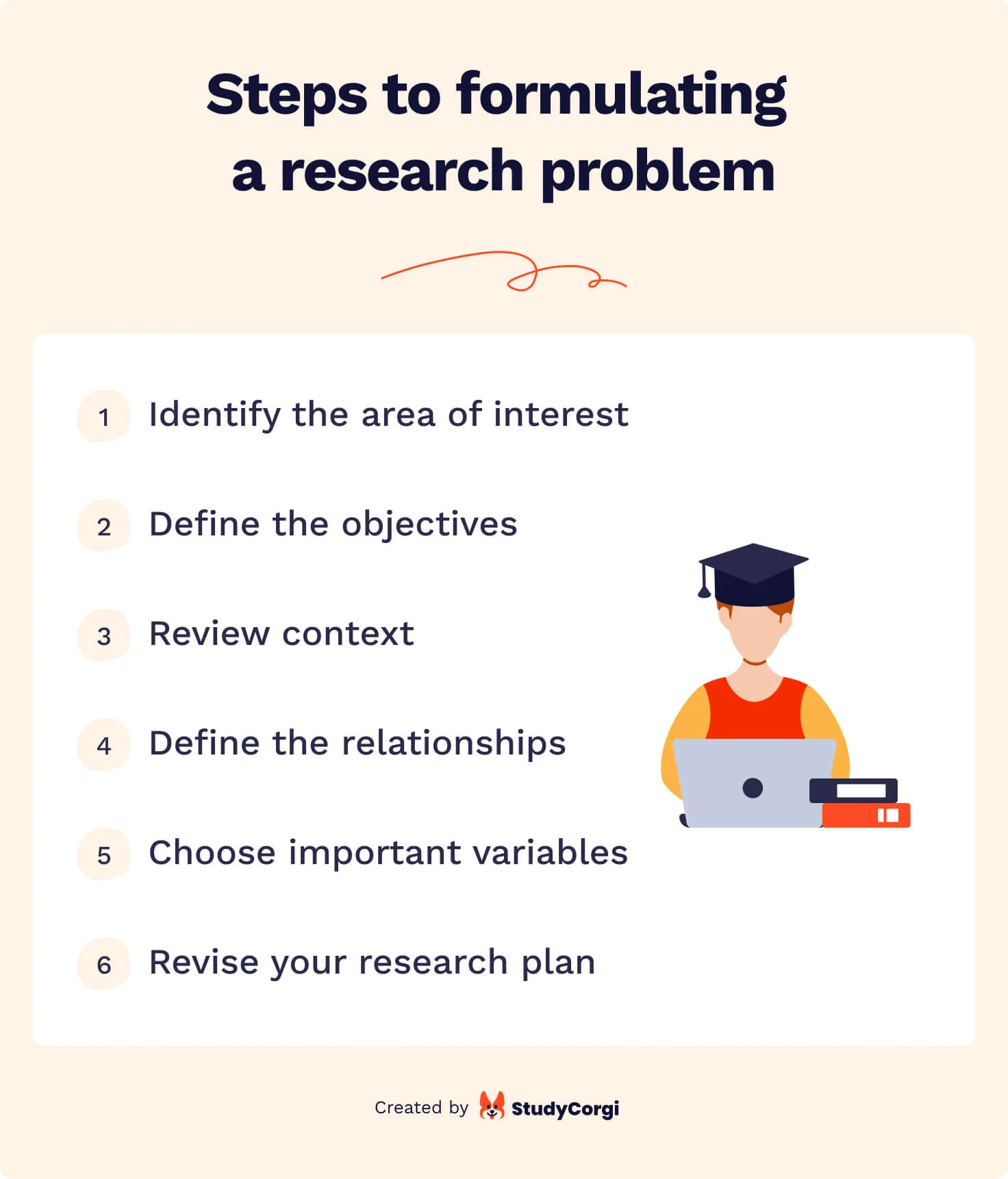🧩 What Is a Research Problem & Why Is It Important?
A research problem is a research issue or a statement that a researcher seeks to solve. It covers a particular field that experts intend to comprehend and address.
The primary objective of the research problem could be to clarify an inconsistency or get answers on the area of study.
Researchers often conduct investigations to solve issues, contribute factual ideas, or fill knowledge gaps. Research problems are important since readers understand the purpose of the investigation and evaluate the results.
Moreover, research problems are the main drivers of the research questions and the approach you will take to conduct a successful analysis.
A good research problem:
- Can be outlined in a clear and concise manner
- Has the main goal
- Has a limited and specific scope
- Generates valid research questions
- Doesn’t have ethical restrictions
- Relates to multiple academic fields of study
- Is quantifiable by research
🔢 Research Problem Types
College and university students encounter various academic writing assignments. Thus, learners must know how to identify a research problem. You can do this by reading widely on the topic of interest to find a knowledge gap or contradiction.

Let us explore the general types of research problems that are available in our research problem maker. These research problems can help in advancing your research further.
Casuist Research Problem
This type of research problem focuses on the right and wrong aspects through moral dilemma analysis. It brings out different cases of moral rules in an investigation. Researchers base the study on their assumptions about human conduct or conscience to identify the research problem.
Descriptive Research Problem
Here, researchers investigate an underlying importance of a particular event or circumstance. This type of research problem helps researchers uncover hidden matters and understudied subjects. It is quantitative; an example could be describing a population or phenomenon under investigation.
Relational Research Problem
This case entails investigating two or more entities that are connected. Researchers are tasked with examining and defining the relationship between the variables.
Comparative Research Problem
Researchers often use a compare-and-contrast approach to identify a relevant research problem. This type is also called a difference research problem. It focuses on identifying the differences between two or more variables.
🧭 Steps to Formulating a Research Problem
The following 6 steps will help you formulate an effective research problem.

Step 1 – Identify the Area of Interest
As a student, you need to learn how to write a research paper, and one common aspect is to identify the area of interest you want to investigate. It will help you pinpoint the challenges present in the specific field. You can write a checklist of your research and add your goals and the issue you want to address. Have a clear outline of the research stages to guide you throughout the process.
Step 2 – Define the Research Objectives
The next step is to outline your goals and objectives clearly. Formulate a thesis statement to guide you in defining your goals since it will have the issues you want to address. Ensure the statement is brief and to the point to help the readers comprehend your research answers and the steps involved.
Step 3 – Review Context
Reviewing your research context allows you to remain focused on the issue. It is important to identify certain variables influencing your object. You will know if your findings are relevant and worth the entire research exercise in terms of time, effort, and budget.
Step 4 – Define Relationships between Variables
Identifying relevant variables will give effective and justifiable solutions to your research problem. Find the critical variables with functional relationships to help you know the extent of each entity during research.
Step 5 – Choose Important Variables
Choose essential variables you will use in your research and their influence on the final results. You will know the potential impact of these entities on your research.
Step 6 – Revise Your Research Plan
Finally, revise your research plan by talking to professionals and mentors in the industry you are investigating. Getting relevant feedback is critical since it will help you know the right questions to formulate.
Ultimately, you can use this research problem maker and generate impressive results within minutes. There is no need to stress about problem formation anymore!
Thank you for reading this article! If you need help to formulate a thesis statement, try our free thesis maker.
❓ Research Problem Maker FAQ
Below are frequently asked questions and detailed answers that might help you to make an informed decision.
Updated: